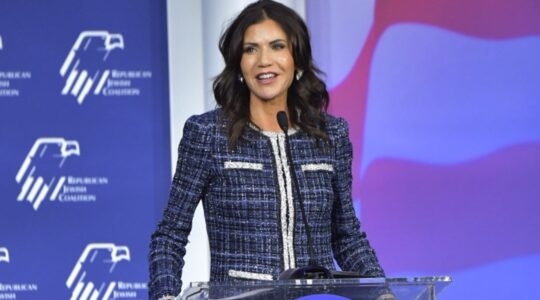
Ed Koch sitting in the office of his campaign manager, David Garth, September 1977. (Zeitgeist Films/The New York Post)

New York Mayor Ed Koch meeting with Israeli President Chaim Herzog during Herzog’s Visit to New York, 1983. (Yaacov Rosenblat, GPO)

Even in his late 80s, political endorsements from Ed Koch, who served as New York City’s mayor from 1978 to 1989, were prized. He appeared in this 2012 video supporting President Obama’s bid for reelection. (Obama Campaign/YouTube)
WASHINGTON (JTA) — Ed Koch, the pugnacious former New York City mayor whose political imprimatur was eagerly sought by Republicans and Democrats alike, has died.
Koch, 88, died early Friday morning of congestive heart failure, his spokesman told The New York Times. He had been hospitalized twice in recent weeks to drain fluid from his lungs.
Famous for greeting constituents with “How’m I doing?,” the Jewish mayor presided over some of the city’s most difficult years, from 1978 to 1989, and helped spur the recovery that would flourish under one of his successors, Rudy Giuliani.
Koch’s third term was mired by corruption scandals and burgeoning racial tensions, and after losing his bid for election to a fourth term in 1989, Koch retired into a happy existence as a Jewish yoda, blessing or cursing political penitents as he saw fit, and not always hewing to the prescripts of his Democratic Party.
In 1990, on a visit to Jerusalem during the first Palestinian intifada, Koch was struck by a rock in the head. He was barely nicked, mopping up his wound with a handkerchief, but the incident became one of Koch’s proudest moments, he often said. “I shed a little blood for the people of Israel,” Koch would recall.
Koch never met a solicitation for an opinion that he didn’t like.
He endorsed Giuliani, a Republican, in his successful 1993 bid to defeat David Dinkins, who had defeated Koch four years earlier, and went on to share — and sometimes take over — the stage at endorsements for other Republicans, including New York Gov. George Pataki, Sen. Al D’Amato and New York Mayor Michael Bloomberg.
The measure of the warmth both parties felt for him was reflected Friday by statements from their Jewish affiliates.
“Mayor Koch was a passionate and principled leader and an outspoken defender of Israel and the Jewish community,” aid Matt Brooks, the Republican Jewish Coalition director, in a statement. “He chose principle over politics and didn’t engage in partisan bitterness.”
The National Jewish Democratic Council statement underscored that whatever his past peregrinations, Koch worked to elect and then reelect President Obama.
“Koch was a consummate and proud Jewish Democrat who advocated fiercely for the U.S.-Israel relationship and the progressive domestic policies in which he truly believed,” a statement said.
Koch stumped hard for George W. Bush’s presidential reelection in 2004, and was not afraid to tell baffled Jewish Democrats why: Bush had Israel’s back, according to Koch.
Four years later, Republicans hoped to win a repeat endorsement for Sen. John McCain (R-Ariz.), but Koch, alarmed at what he saw as Republican plans to degrade the social safety net he had championed as a congressman in the 1970s, instead threw in with Barack Obama. He proceeded to become one of Obama’s biggest Jewish headaches, lacerating the president with criticism for his perceived coolness to Israel.
“I weep as I witness outrageous verbal attacks on Israel,” he wrote on the Huffington Post in April 2010. “What makes these verbal assaults and distortions all the more painful is that they are being orchestrated by President Obama.”
In 2011, Koch endorsed Republican Bob Turner for a special election to fill a vacant congressional seat in New York in what was seen as a safe Democratic district, even though the Democratic contender, David Weprin, was both Jewish and stridently pro-Israel. Turner won and, message sent, Koch watched Obama retreat from criticism of Israel’s settlement policies — and did not hesitate to claim credit for the conversion.
“I believe the recent vote in the 9th Congressional District in New York affected in a positive way the policy of the U.S. on the Mideast,” Koch wrote supporters in an email after that election.
Koch turned away Republican pleas to re-up his attacks on Obama before the last election, and enjoyed telling friends that he had received a pleading from no less than Sheldon Adelson, the casino magnate who made the president’s unseating his mission.
Koch instead enthusiastically endorsed Obama in a long video just before the election — an appearance Jewish Democrats credit with upping Obama’s Jewish numbers in Florida, a critical swing state.
Yet he was disappointed in Obama’s choice of Chuck Hagel, a former Republican senator from Nebraska with a record of Israel criticism and a fraught relationship with the pro-Israel community, for secretary of defense.
“It’s very disappointing, I believe he will ultimately regret it,” Koch told The Algemeiner in a Jan.7 interview, “and it undoubtedly will reduce support for [Obama] in the Jewish community, but I don’t think he worries about that now that the election is over.”
Rabbi Joe Potasnik, the executive vice president of the New York Board of Rabbi, said Koch told him his hero was Harry Truman, another Democratic Party leader unafraid of defying his base.
“He admired independence,” Potasnik recalled in interview Friday, “people who didn’t just take the party line but were able to stand on the independent platform.”
Potasnik, who befriended Koch over the years as they attended multiple social events together, said Koch in person was “painfully shy” but reveled in the attention he got when passersby recognized him and would call out “Mr. Mayor!”
Koch held within his breast twin passions he guarded ferociously: for the Jewish people, and for New York.
His tombstone is engraved with his name, his years as mayor, the Shema prayer, and the final words of Daniel Pearl, the Wall Street Journal reporter murdered in Pakistan by terrorists in 2002: “My father is Jewish. My mother is Jewish. I am Jewish.”
His chosen burial place is a non-denominational churchyard at the corner of 155th Street and Amsterdam — selected because he could not imagine eternity outside Manhattan.
That was the sole sore point between Koch and Potasnik, who, working with other rabbis, found available Jewish sacred ground on the island. But Koch would not be moved.
“When Ed Koch made up his miind, there wasn’t anyone — there was no superhuman being who could change it,” Potasnik said.
JTA has documented Jewish history in real-time for over a century. Keep our journalism strong by joining us in supporting independent, award-winning reporting.





